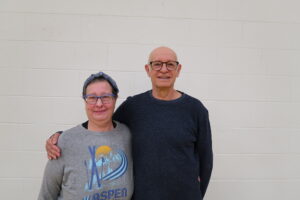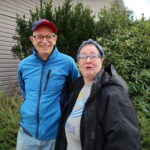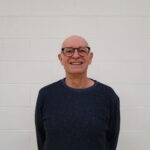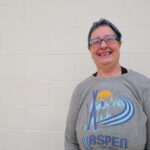Description
One Small Step conversation partners Phil Bailey (71) and Susan Sheremeta (55) talk about heritage, time in jail, the role of the government, and family.Subject Log / Time Code
Phil Bailey (PB) and Sue Sheremeta (SS) introduce themselves.
PB talks about Building Bridges Maine, SS talks about wanting to be on record that she tried to bring people together, having a conversation archived at the Library of Congress and doing something her new grandchild can be proud of.
PB asks Sue about the time she spent in jail, her biblical views, and thoughts on Ukraine, given her Ukrainian heritage.
SS talks about being wrongfully imprisoned in 2018, domestic abuse, spending six months in jail, how the Catholic prayers she was raised with had lost their meaning but in jail, took on a new meaning.
SS asks PB if, given his French heritage, he was raised with French values. PB talks about his relationship to France, the French language.
SS talks about her Ukrainian grandmother.
Participants talk about Hancock Grammar School and cultural differences.
SS talks about her father's influence, teaching her that money is not everything. Says they had a lot of financial resources growing up and that she lived a Kardashian lifestyle before there were even Kardashians. Her dad taught her that many wealthy people were unhappy and how that made her want to go out and live an 80s street kid lifestyle.
PB talks about how is mother kept him away from his father after his parents divorced and how he didn't really know his dad until later in life.
PB talks about how he learned that his family had been destroyed by WW2.
PB talks about organizing a group of students called Organized Action for Students and how he was in jail for a month at age 17. He goes on to discuss the contrast between his parents and how his father was more politically active and how that influenced him.
PB talks about managing a restaurant in Denver, CO where he met Roy Romer, former governor of Colorado, who PB worked on a campaign for, and Romer's influence on him.
SS talks about an elderly woman who wrote her letters in jail and how that helped SS re-establish her relationship with God.
PB and SS talk about what being in prison can do to people and how it influenced them.
Participants discuss their personal political values. For PB, inclusion, possibility, equality, representation.
SS defines herself as a constitutional first conservative, how disturbed she is by the vitriol, her belief in laissez-faire government and economics, small government, economic responsibility, and the free market.
PB talks about a classic "Down East" view on politics, the role the government can play in people's lives, and governments keeping the roads clean during the long Maine winters. He points to the good that government can do, and how so much depends on who is in power. He also talks about Down East Community Partners (DECAP).
SS talks about how she has been helped through DECAP.
Participants ask each other if they ever feel troubled by people who have the same beliefs as them. They both says yes.
PB talks about indigenous sovereignty and the Maine Indian Land Claims Settlement Act (MICSA) of 1980, how he thinks that progressive settlers who support increased Wabanaki sovereignty need to think about what that will actually mean for them.
SS asks PB if he thinks common sense is uncommon, and if so, to what he attributes it.
PB tells a story about the conversations and debates he has with a man he grew up with who runs a garage in Hancock, Maine. PB attributes lack of common sense to silos and polarization.
SS agrees and also attributes a lack of common sense to a collective lack of intellectual curiosity. She brings up Walter Cronkite, says that if you yelled at the TV back then, no one could hear you and how now, everyone is reflected through social media. SS does not have social media.
SS talks about the separation between church and state, and tells a personal story.
SS talks about how the people representing her in government are falling short. She discusses Donald Trump and says she may not agree with how he communicates that he made a lot of wise political decisions and actions.
PB talks about his experience working as a spokesperson for Roy Romer through the Rocky Flats Advisory Council and how communications backfired one day.
PB talks about how Building Bridges Maine is trying to find ways to help people authentically engage on controversial topics. He talks about democracy being at risk.
SS talks about feeling like recent generations dropping the ball, how hard our ancestors worked to make things better, and how privileged poor people in North America now are in comparison to poor people in South America.
PB talks about going down to Hattiesburg, Mississippi after Hurricane Katrina with his stepson to do carpentry work.
SS says these sorts of encounters are the kind of thing that made her initially turn away from religion. She asks PB what kind of religion he was raised with.
PB talks about singing in the congregational choir, his mother sending him to bible school one summer, and eventually, during an argument with his mother at age 16, learning that his family was Jewish and that they had been targeted by the Nazis. PB says he is agnostic.
PB asks if anything about him surprised SS. She says yes, that he didn't want to talk about climate change and that he'd spent time in jail. She'd thought that her faith could be a bone of contention and was relieved it wasn't.
PB talks about his hopes for the future, says he feels we're at a critical point. Talks about Braver Angels and Building Bridges Maine. He hopes that people can find a way to meet.
SS says, "I agree. Well, we've met each other and I think that's one small step, isn't it?"
Participants
- Phil Bailey
- Susan Sheremeta







